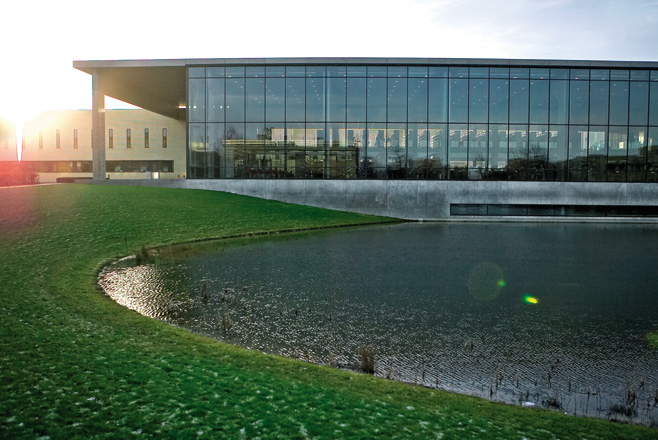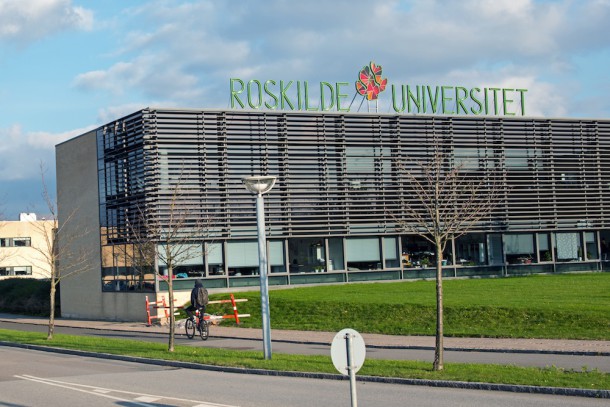The most important task of Roskilde University is to contribute to experimental, innovative forms of learning and knowledge creation.
The university is research-driven and provides education for future generations of managers, teachers and experts based on advanced knowledge.
RUC is characterised by:
Educational Principles
The basic educational principles at the university are problem-oriented project work, participant direction and joint responsibility. From enrolment to graduation, students are trained to assess the importance of academic problems and the relevance of selected theories and methods on a scientific basis. Project work is participant-directed and builds on the importance of student commitment and own and joint responsibility.
The phased choice of specialisation is based on the students’ experience with the problem areas of the individual subjects and the scientific approaches. Students gain their first experience at the basic studies, which point them in the direction of advanced-level courses, where many different specialised course studies may be combined within and across disciplines and main subject areas, both during the bachelor studies and the master’s studies.
At RUC, students are responsible for and control their education themselves. Based on their own critical sense and active participation, students are guided through their study programmes at RUC which offers an international, interdisciplinary and educationally challenging environment providing the perfect framework for their studies.
The History of Roskilde University
A New University in Denmark
Roskilde University was formed under the Act of Copenhagen University's Siting and University Centres of 1970. The Act was passed only after a great deal of debate between the conservative-liberal coalition government in power at the time and the opposition. The government wished to set up a university in the city of Roskilde to take some of the pressure off Copenhagen University; the opposition wanted this Denmark's fourth university to be located in the city of Aalborg on the mainland to improve the educational level of the population of northern Jutland. As a result, universities were established in both cities.
RUC Opens the 1st September 1972
Roskilde University opened its doors to students, 723 of them, on 1 September 1972. The founders of the University wanted a different approach to education and science than what was already being practiced at Denmark's three other, traditional universities at the time. Thus RUC's first year was characterised by a completely new educational concept that included elements such as basic studies programmes, interdisciplinarity, problem orientation and group project work.
Back in 1972, these educational ideas were both unorthodox and controversial, but the traditional universities in Denmark have now adopted much of the original RU concept themselves, not least the concept of group project work, which is today a recognised academic method. RU can also be said to have brought to Denmark the Anglo-Saxon concepts of interdisciplinarity and less well-defined boundaries between academic fields.
University Centre Changes to University in 2008
RUC was founded as the Roskilde University Centre, but 'Centre' was dropped from its name in 2008, and the institution became simply Roskilde University. With this, the name of 'university centre' disappeared from the Danish educational sector (Aalborg University had previously also got rid of the 'centre' in its name). However, the University is still often called 'RUC' in Danish, since this remains a strong trademark, or brand, for the institution among the public. Today, RUC has more than 9500 students and is thus the fifth-largest university in Denmark.
The most important task of Roskilde University is to contribute to experimental, innovative forms of learning and knowledge creation.
The university is research-driven and provides education for future generations of managers, teachers and experts based on advanced knowledge.
RUC is characterised by:
Educational Principles
The basic educational principles at the university are problem-oriented project work, participant direction and joint responsibility. From enrolment to graduation, students are trained to assess the importance of academic problems and the relevance of selected theories and methods on a scientific basis. Project work is participant-directed and builds on the importance of student commitment and own and joint responsibility.
The phased choice of specialisation is based on the students’ experience with the problem areas of the individual subjects and the scientific approaches. Students gain their first experience at the basic studies, which point them in the direction of advanced-level courses, where many different specialised course studies may be combined within and across disciplines and main subject areas, both during the bachelor studies and the master’s studies.
At RUC, students are responsible for and control their education themselves. Based on their own critical sense and active participation, students are guided through their study programmes at RUC which offers an international, interdisciplinary and educationally challenging environment providing the perfect framework for their studies.
The History of Roskilde University
A New University in Denmark
Roskilde University was formed under the Act of Copenhagen University's Siting and University Centres of 1970. The Act was passed only after a great deal of debate between the conservative-liberal coalition government in power at the time and the opposition. The government wished to set up a university in the city of Roskilde to take some of the pressure off Copenhagen University; the opposition wanted this Denmark's fourth university to be located in the city of Aalborg on the mainland to improve the educational level of the population of northern Jutland. As a result, universities were established in both cities.
RUC Opens the 1st September 1972
Roskilde University opened its doors to students, 723 of them, on 1 September 1972. The founders of the University wanted a different approach to education and science than what was already being practiced at Denmark's three other, traditional universities at the time. Thus RUC's first year was characterised by a completely new educational concept that included elements such as basic studies programmes, interdisciplinarity, problem orientation and group project work.
Back in 1972, these educational ideas were both unorthodox and controversial, but the traditional universities in Denmark have now adopted much of the original RU concept themselves, not least the concept of group project work, which is today a recognised academic method. RU can also be said to have brought to Denmark the Anglo-Saxon concepts of interdisciplinarity and less well-defined boundaries between academic fields.
University Centre Changes to University in 2008
RUC was founded as the Roskilde University Centre, but 'Centre' was dropped from its name in 2008, and the institution became simply Roskilde University. With this, the name of 'university centre' disappeared from the Danish educational sector (Aalborg University had previously also got rid of the 'centre' in its name). However, the University is still often called 'RUC' in Danish, since this remains a strong trademark, or brand, for the institution among the public. Today, RUC has more than 9500 students and is thus the fifth-largest university in Denmark.
Department of Communication, Business and Information Technologies
Department of Culture and Identity
Department of Environmental, Social and Spatial Change
Department of Science, Systems and Models
Department of Psychology and Educational Studies
Department of Society and Globalization (ISG)
International Bachelor Study Programme in Humanities
International Bachelor Study Programme in Natural Science
International Bachelor Study Programme in Social Science
IELTS: 6.5 or
TOEFL paper-based: 550 or
TOEFL computer-based: 225 or
TOEFL internet-based: 80 or
Cambridge Certificate of Proficiency in English (CPE): 45 or
Certificate of Advanced English (CAE): 45
|
The fee is for 1 semester (30 ECTS point) |
Non EU/EEA students |
|
|---|---|---|
|
Bachelor of Humanties |
4.050 Euro |
|
|
Bachelor of Social Science |
4.050 Euro |
|
|
Bachelor of Science |


2014 © a2fairs. All Rights Reserved. powered by twopulse.com